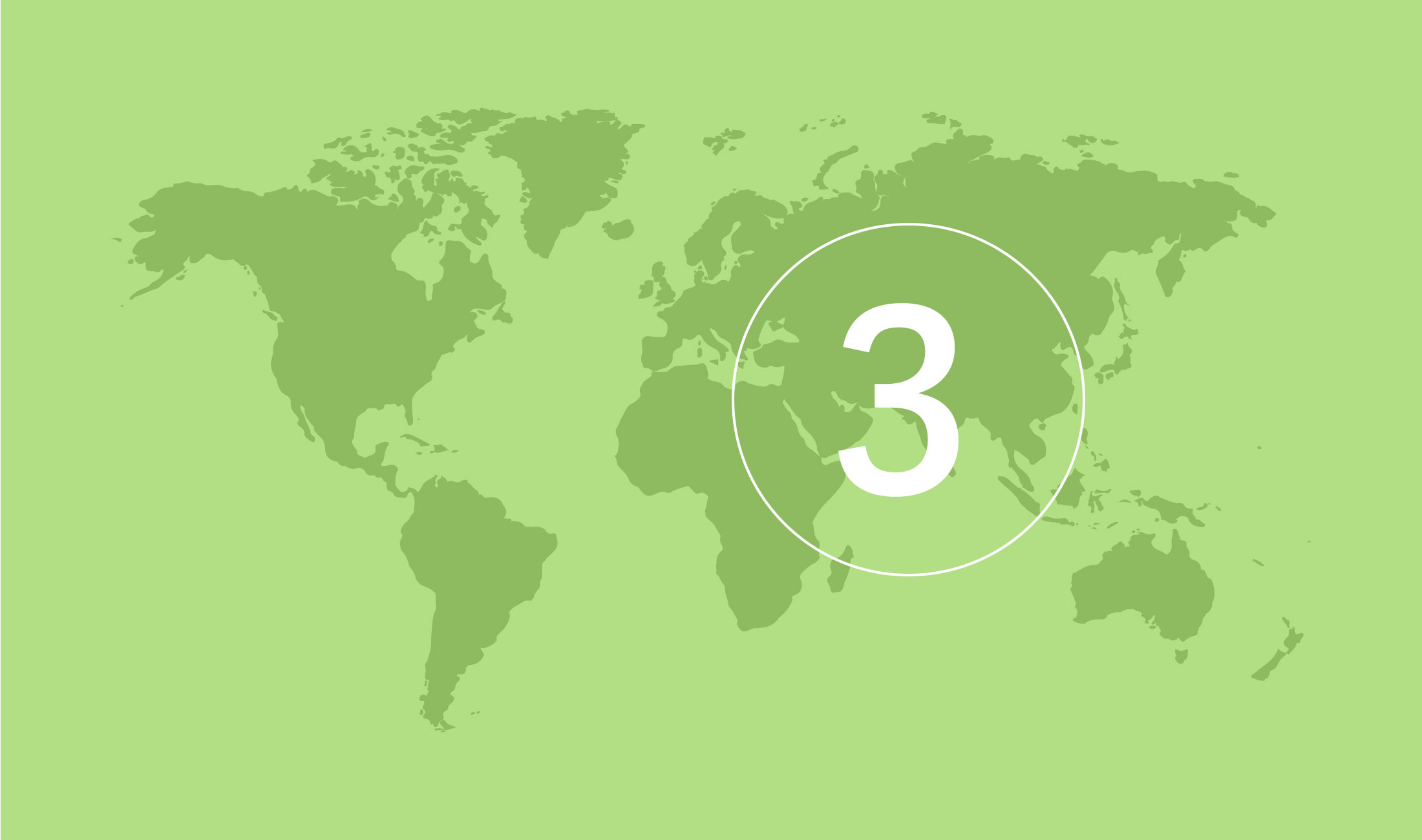
Mauritius
Category
3 of 7
| Risk type | Short | Long |
|---|---|---|
| Sovereign | ||
| Public | ||
| Bank | ||
| Corporate |
The icons indicate EKN's risk assessment.
A lower country risk category means a lower country risk. The icons mark EKN's ability to cover risks to different buyers in the country.
-
No policy established
- EKN has not analysed this country recently and therefore has no current opinion. If an exporter submits an application for such a country, EKN performs an analysis of the country at short notice and determines a policy.
-
Normal risk assessment
- EKN decides on guarantee issue based on an assessment of risk in the transaction. There are no predefined restrictions in the risk assessment or assumptions for risk assessment.
-
Restrictive risk assessment
- EKN sets stricter requirements in the risk assessment in order to guarantee a transaction. EKN may have specified special criteria that are key to the risk assessment of the guarantee holder category in question. This may mean that EKN sets a requirement that the counter party must have its own hard currency earnings or that external support can be expected, or that EKN sets a requirement for a letter of credit, government or bank guarantee. If the formulation of the transaction deviates from a defined restriction, we normally set more stringent conditions and may in the worst case refuse to guarantee the transaction. More stringent conditions may be that we reduce the sum guaranteed, raise the premium or require some form of security.
-
Normally off cover
- Here EKN does not normally cover currency transfer risks. However in some circumstances EKN may be able to go further with high risk countries than the restrictions of the country policy indicate. The application is then tested under the so-called GSL facility, which refers to guarantee issue with special country evaluation. There are specific requirements for this, primarily that the exporter has experience of the market in question. The risk is then shared with the exporter and by means of a mark-up on the premium.
-
OECD or EU countries
- Because of EU rules, EKN cannot issue guarantees for transactions with a risk period of less than two years for exports to Australia, EU countries, Iceland, Japan, Canada, Norway, New Zealand, Switzerland or the USA. If you have any questions, please telephone us on +46 8-788 00 00.
Country risk analysis
Country risk analysis archive
Country Risk Analysis of Mauritius
The latest Country Risk Analysis of Mauritius was issued in July 2025.
Background
Mauritius is an upper-middle-income country and among the wealthiest nations in Africa. Strong earnings from the tourism industry and significant capital inflows drive growth and contribute to sound external liquidity. Population growth is near zero, meaning per capita income increases at the same pace as GDP. According to the World Bank’s Worldwide Governance Indicators (WGI), the country’s institutions rank among the top quartile globally, and Mauritius is one of the few African nations with a strong democratic tradition.
Its governance is classified as a “free democracy” by the independent US-based research institute Freedom House, and it consistently achieves the highest score on the African continent (86/100 in 2025, compared with Sweden’s 99/100). Since independence in 1968, politics has been dominated alternately by the Jugnauth and Ramgoolam dynasties.
Among the country’s weaknesses are the dominance of the tourism and financial sectors in the economy. Crises in the international economy quickly have repercussions on the small and open domestic economy. For example, in 2020, tourism revenues fell by nearly 75 percent while both direct and portfolio investments turned sharply negative. This resulted in a 15 percent drop in GDP and current account deficits of 13 and 12 percent in the following two years. The tourism industry accounts for about 25 percent of GDP, including indirect effects, with the largest number of tourists coming from France and the United Kingdom.
The banking sector is large relative to the economy, at nearly 400 percent of GDP. This makes the banking system and economy sensitive to changes in international financial flows, while problems in the banking sector risk spilling over to the sovereign in the event of a systemic crisis. Deposits from multinational corporations (“GBCs”) account for around one third of bank deposits, an important source of hard currency but also a liquidity risk for domestic banks. Public finances are also weak compared to other countries in country risk category 3. Public debt is high and interest costs are significant relative to government revenue. Another weakness is the country’s vulnerability to climate-related risks.
Cyclones, floods, and rising sea levels pose particular threats, especially to agriculture (sugarcane production) and tourism. The country’s coral reefs, vital for tourism, are threatened by rising sea temperatures and sea levels. However, thanks to strong institutions, the country has a relatively good capacity to manage these risks. In the ND-GAIN index (2023), which measures countries’ vulnerability to climate change and their capacity to mitigate risks, Mauritius ranks 49th out of 187 countries.
Public finances: Ramgoolam’s challenge
Mauritius is among the countries most at risk of facing high, country-specific US tariffs on the continent. Due to a large trade surplus with the USA, there is a risk of tariff rates of up to 40 percent, which would be the third highest in sub-Saharan Africa. The USA is the largest trading partner, accounting for about 11 percent of total exports, which include fish and textiles. For these sectors, such tariffs would be devastating, but financial services and tourism are the more important long-term drivers of the country’s economy. The textile industry is already in decline, which is likely to accelerate if duty-free access for much of the sector is removed.
According to the IMF’s April forecast, the economy is expected to grow by an average of around three percent per year from 2025–2027, slightly above the average of the past decade. In 2024, the number of tourist arrivals increased by approximately seven percent, returning to pre-pandemic levels. However, the tourism industry faces long-term challenges. Due to stagnant growth in Europe, demand from European tourists—who make up over 60 percent of the market—is decreasing.
At the same time, competition from cheaper destinations such as Bali, Sri Lanka, and Thailand has intensified. Consequently, market development and diversification are needed for the tourism industry to continue driving the economy. Direct investments are expected to rise to over 20 percent of GDP in 2025 and then stabilise at just above 10 percent, supporting growth. Inflation has been volatile over the past five years but is expected to stabilise below the ten-year average in coming years. In 2024, inflation was 3.6 percent, low by regional standards. Mauritius is largely an import-dependent economy, with fossil fuels and food accounting for around 40 percent of imports in 2023, making a significant portion of inflation imported.
Foreign exchange reserves strengthened in 2024, covering nearly twelve months of imports—a very strong level. An improved trade balance means current account deficits are expected to decline over the coming years, supporting reserves. The IMF forecasts a halving of the deficit to four percent over the next five years compared with the past five-year average. However, current account deficits remain large, and external debt is high as a share of GDP for a country in country risk category 3.
Therefore, the large foreign exchange reserves are crucial for maintaining confidence among investors. The currency, the Mauritian rupee, is freely floating and has remained relatively stable even during recent crises. Many companies establish operations in Mauritius due to tax treaties and opportunities for long-term business, particularly in eastern and southern Africa, where transaction risks are much higher. This has a stabilising effect on international capital flows and reduces the risk of capital flight during economic crises.
On the fiscal side, public debt rose again in 2024 and is expected to exceed 90 percent of GDP in 2025–2027, significantly higher than the average of around 60 percent for other countries in country risk category 3. The increase in public debt follows a revision revealing that the previous government understated fiscal deficits and overstated GDP growth in certain years.
As a result, public finances are weaker than previously thought. Interest costs on public debt account for around ten percent of budget revenues, which is significant but roughly in line with the average for country risk category 3. High interest rates on domestic loans, which constitute about four-fifths of the debt stock, are driving up costs, while external loans are mostly on concessional terms. Despite recent shortcomings in fiscal management, Mauritius’ economic institutions are overall significantly stronger than the average for category 3, creating conditions to manage the high public debt, which is considered sustainable.
Mauritius’ democratic tradition was maintained in November 2024, when Navin Ramgoolam was elected prime minister. The election was conducted without political unrest, and Pravind Jugnauth conceded defeat the following day, exemplifying one of the country’s key strengths. Ramgoolam’s main challenge will be to implement extensive and, for the population, painful fiscal consolidation. Budget consolidation is essential for Mauritius to retain its investmentgrade status, which is important for the country’s ability to continue attracting international capital flows.
Overall, recent risk developments confirm Mauritius’ classification in country risk category 3. Weaknesses in public finances and vulnerability to fluctuations in tourism and capital flows are balanced by continued strong growth, high external liquidity, and political stability.
Business environment
Mauritius’ business environment is among the strongest in Africa. The economy is open, and policies are generally business-friendly. There are currently 45 active double taxation treaties, and over 12,000 global companies are established on the island. Europe and the USA are the primary focus for trade and investment, but strategic efforts are also being made towards China, India, South Africa, and Kenya.
Mauritius depends on positioning itself as an attractive location for business and international transactions, and therefore its business environment is likely to remain appealing from an African perspective. Trends in the World Bank’s WGI are stable, meaning the country’s institutions continue to rank closer to Sweden’s than to the average in sub-Saharan Africa. There have been only minor changes in governance effectiveness and rule of law over the past decade, while the trend in regulatory quality is slightly positive. Corruption is an issue, but Mauritius still ranks among the top third globally in terms of control of corruption. In Africa, only Seychelles, Cape Verde, Botswana, and Rwanda rank higher.
EKN’s business assessment considers the risk of negative impacts on human rights (HR), focusing on potential impacts from operations in countries where the exported goods will be used. Issues of particular importance include working conditions, child and forced labour, excessive use of force by security forces, indigenous peoples’ rights, and land rights. In Maplecroft’s HR index for these dimensions, Mauritius shows a somewhat higher human rights risk profile compared with OECD high-income countries, particularly regarding occupational health and safety, child labour, and forced labour. However, compared with countries at a similar income level, Mauritius scores lower risk levels across all indicators.
EKN’s policy
EKN applies standard risk assessment for all buyer categories, meaning there are no predefined restrictions.
EKN’s commitment and experience
Over the past decade, EKN has guaranteed an average of a handful of transactions per year. Current exposure mainly involves a telecom deal with deliveries to Tanzania and Madagascar. Other exposure also largely concerns transactions where the risk object is in Mauritius, but deliveries go to other African countries. Besides telecom, these deals include mining equipment, construction machinery, passenger cars, and paper.
Payment experience is generally good, with virtually no current delays. Existing claims primarily relate to a telecom transaction with deliveries to Nigeria, and two mining transactions with deliveries to Guinea/Mali. In all cases, the cause of loss was related to the underlying operations of the companies, not transfer risk in Mauritius.
More for companies that want to export to Mauritius

EKN's guarantees
EKN's guarantees reduce the risk of payment defaults and help banks support businesses. Which guarantee suits your needs?
EKN's guarantees
Guarantee guide
Are you unsure which guarantee is the best fit for your specific transaction? Try our guarantee guide.
Guarantee guide